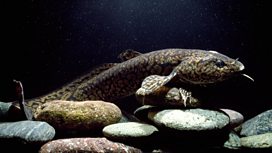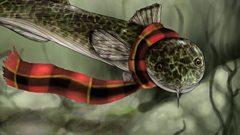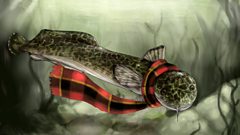Burbot
Brett Westwood explores our relationship with a flabby, sour-faced fresh water fish that outwitted aristocracy.
The burbot is the skulker under the rocks, the flabby, sour-faced cod of cold, fresh water. It is not loved for its looks, but it was once prized for its body. At one time it was common here but has now gone from UK shores, believed extinct in the 1960s. This is the only member of the cod family that lives in fresh water and for centuries it swam in the eastern part of England to be pursued by fishermen for its firm, white flesh and unbelievably rich liver oils.
Barbot Hall in Rotherham and Burbolt Lane in Cambridge show it was once important – and so common that some records say it was fed to pigs. In North America it is a common angling fish; but in the early 20th century, the rich oils were so prized the Burbot Fishing Company processed half a million fish a year. It is still found in Europe and Russia. Chekhov wrote a comic story, The Burbot, showing how this Cinderella of fish could outwit even the aristocracy.
Some want the burbot restored to our waterways, arguing in the present desire to re-wild it should be allowed to live here once more. After all, the burbot was so much a part of our culture; However, others say it is best to leave it as a faint memory as climate change will make its life unbearable.
Either way, the burbot is a reminder of how quickly we forget what was once so common.
Original Producer : Andrew Dawes
Archive Producer: Andrew Dawes for ����ý Audio in Bristol
Last on
![]()
Find out about Britain's forgotten fish.
Clips
-
![]()
The World According to Burbot
Duration: 01:36
-
![]()
Fat, flabby, disgusting. Meet the burbot
Duration: 02:15
-
![]()
'It's like having a liver the size of your leg'
Duration: 01:23
James Maclaine

In addition to managing the collection, James also helps to identify new and existing species of fish. His work has been published in key science journals including the , and . James has also participated in international workshops and given hundreds of talks on the subject of deep-sea fishes, particularly anglerfishes.
Captain Ashley Bonser
Xanthe Clay

Back in the UK, she worked as a bookseller specialising in cookery books, and when the bookshop chain folded she spent her redundancy money training to be a chef. She worked as a chef and caterer in the West Country before starting the column for . Since then she has worked on both food and cookery features for Weekend Telegraph.
�շɾ��ٳٱ��:��
Professor Paul Kemp

Specific applications include fish pass and screening design, environmental flows, habitat restoration, dam removal, and species reintroduction.
George Monbiot

�շɾ��ٳٱ��:��
Dr Steve Simpson

He is also fascinated by marine bioacoustics, stemming from his discovery that fish, crab and coral larvae can use their soundscape as a roadmap to guide their movement to habitat at the end of their early life in the plankton. He works with industry, policymakers, regulators and conservation agencies to ensure the latest scientific knowledge is used in managing and protecting the oceans.
�շɾ��ٳٱ��:��
Broadcasts
- Tue 7 Jul 2015 11:00����ý Radio 4
- Mon 13 Jul 2015 21:00����ý Radio 4
- Sun 4 Oct 2020 06:35����ý Radio 4






